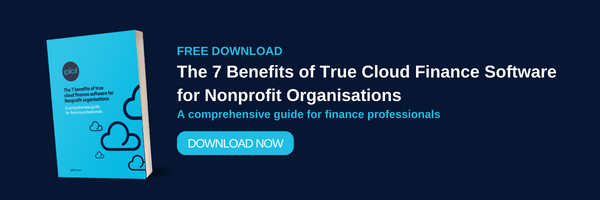
Company Snapshot
Number of iplicit users
35 in Finance and a further
300 across 14 countries
Previous System
Multiple versions of QuickBooks, and Sun
Go Live
January 2021
Website
www.healthpovertyaction.org
Nonprofit sector
Discover our charity accounting software
Health Poverty Action transforms finance function through global adoption of iplicit
Sandra Tcheumeni Boschet, Head of Finance & Administration at Health Poverty Action, discusses the need for a unified system.
Tell me about Health Poverty Action?
Health Poverty Action is an International NGO that acts in conjunction with health workers, activists and communities worldwide to improve health and challenge both the root causes and symptoms of poverty. We recognise that poor health worldwide stems from political, social and economic injustices
We are a very progressive charity and focus on advocacy and lobbying of various governments, in order to change policies to help the marginalised.
Development organisations tend to cluster together which leaves large populations with almost no support at all. We make these most neglected populations our highest priority.
As well as strengthening health services, we work on areas such as nutrition, water, sanitation,
immunisation, and income generation. Tackling one cause of poor health in isolation can give the appearance of improving health, but in reality might do little more than change the cause of death.
We are currently active in 14 countries and believe that tackling numerous factors together saves lives.
The thing that made iplicit stand out was just how much it could be tailored for our exact requirements.”
What are the day-to-day demands that are typically placed upon your finance system?
The demands placed upon our system are significant; not only because of the size of our organisation but because of the number of projects that we handle simultaneously, the international nature of our business and the requirement to provide insight and transparency to a wide variety of institutional donors.
Our financial and internal controls have to be very tight. We use the system, across the entire organisation, from first thing in the morning to the very end of the day. An organisation like
ours, has to be very accountable to its donors, not only to show that we’re spending their money effectively but often showing how their money is being spent; we do this by relating it to specific projects.
Understanding our expenditure by territory, project and by donor are just some of the constant demands placed upon the system. Dealing with Foreign Exchange is also an added complexity for our system.
This is in addition to all of the typical demands that you’d expect from the day-to-day running of an organisation with several hundred staff and multiple entities throughout the world.
We also have to be able to see financial reporting by entity and for the entire group, at the touch of a button, with a high level of confidence that the information is always accurate and in real-time. Therefore, having the hierarchy in the system, and reporting dashboards to facilitate this, is very important.
What led to your decision to change systems?
This is my first role in the third sector. I’ve worked in both the private and public sector before and, as a result, I came to this role with a very clear vision as to how I wanted things to work in the Finance Department.
Primarily, the reason why we changed QuickBooks was because it wasn’t a unified finance system. We had multiple copies, and versions, running to cover all the territories and it was extremely difficult to have a clear understanding of finances, across all entities, in real- time. We found it very challenging, to say the least, to address problems in a territory if the problems weren’t being identified at the earliest opportunity. Dealing with multiple systems meant that sometimes you
would discover issues much later than would be ideal, because there wasn’t a single view that could be accessed centrally. Strengthening our internal controls and facilitating internal audits was equally one of our top priorities.
A secondary reason for change was also because our old system was on-premise and I knew that we had to go cloud, particularly because we are working increasingly with remote locations and we had to have a system that could be accessed by any device on any browser, rather than being
constrained by needing server hardware and software locally for each set up.
With so many staff used to the old accounting software, and not perceiving the additional demands that the organisation required from a finance solution, I recognised that there would be a huge cultural challenge to ensure that a new system would be adopted by all types of users.
I reviewed many potential finance systems over the course of the next year before deciding upon iplicit.
The timesaving we experience with iplicit is enormous! We are currently preparing our year-end process, and already we are saving six weeks consolidating the various project balance sheets from various QuickBooks versions. Just take Donor Reports as an example – it’s essential that we have transparency and can report back to Donors on how and where their funds have been spent. With our old system, each Donor report would take three weeks to produce, with iplicit, if all data has been entered correctly, a report can be done in less than 2 days!”
Sandra Tcheumeni Boschet, Head of Finance and Administration

Why did you choose iplicit over the other systems being considered and did you have any key criteria?
The first thing that struck me about iplicit was that it was so innovative. However, choosing your system represented a risk for our organisation and for me personally, if I was going to select it. I was looking at this in 2020, when you had barely been trading a year or so. We shortlisted three systems, having considered offerings from 7 different vendors! The thing that made iplicit stand out was just how much it could be tailored for our exact requirements.
No system is ever everything you want from the start, but the innovative way that iplicit was architected and the way it could be customised in the data, without using programmers, meant that it was very different than the other options we looked at. iplicit was also compelling from a price perspective, but I must point out that price was only a consideration from about halfway through the research; we started out looking for best fit before adding budget into the mix.
We also involved our auditors in the decision-making process; we thought it was important that we had a system that could also satisfy their requirements. They were very happy with the system capability and when we come to an audit at the end of this year – our first with iplicit – they will already know what to expect.
When I pitched the idea of adopting iplicit's cloud accounting software tailored for non-profits to the board, I was very honest with them in saying that it was a risky decision, but it was one that I was willing to make at the time; the fact that it was true-cloud, so innovative and addressed 80-85% of what we needed, straight from the start – made it an easy decision for me to make. The board backed my recommendation and we’ve not looked back since!
Since going live with the system, how has your general experience been with both the software and iplicit staff?
I'll start with the software, which we’d researched thoroughly before making a decision, so there weren’t any surprises because we knew what we were getting. We understood that we wouldn’t
have 100% of functionality, tailored to our needs from day 1 but we had developed a clear roadmap, with a timeline, and things have progressed as we expected.
Dealing with our staff was a bit more of an unknown; we knew that we would have some resistance from users as many of them had been using the old system for 10-15 years. Also, we experienced quite a difference in feedback between different countries – In our Asian territories, particularly Myanmar, they were using a Sun systems and the users were happy with their existing set up and functionality and didn’t feel compelled to upgrade their solution – they couldn’t necessarily see all of the new benefits that our central Finance Department would experience.
In Africa, it was a completely different scenario – they were using old copies of QuickBooks and the improvements in functionality were dramatic, but it meant we had to give weekly training until the new habits started to sink in and they were using the new system in earnest. However, during the last 10 months, since launch we now have pretty much everyone where we need them to be and I think it’s fair to say that there is now a clear understanding across all the teams, globally, regarding the benefits that the new system brings, now they are used to the improved ways of working.
From a functionality perspective, what are the major differences with your new system compared
to the old one and what benefits have you seen?
For me, the standout feature is being able to have visibility on finance management in all the countries, in real-time, at the touch of a button. Being able to monitor budgets versus actuals. Also, the authorisation and approval workflows provide extensive internal control. We spent a good deal of time ensuring that the correct controls were configured to take advantage of this feature.
Also, the timesaving we experience with iplicit is enormous! We are currently preparing our year-end process and already we are saving 6 weeks of our time consolidating the various project balance sheets from various Qbs versions. Just take Donor Reports as an example – it’s essential that we have transparency and can report back to Donors on how and where their funds have been spent. With our old system, each Donor report would take 3 weeks to produce, with iplicit if all data has been entered correctly, a report can be done in less than 2 days! The fact we can have predefined
reporting formats in the system is an added bonus. We are still working with the teams to have these included in the system soon and we believe the time saving benefit will be huge as we have some very complex donor reports to produce on a regular basis.
I can see anything, at the click of a button, in any country, across the entire organisation. It means that I can proactively tackle issues quickly and not wait for departments to report problems at a later date. It also means that these issues can’t ‘hide’ in the various departments.
The key thing for me is having a unified system, with everybody using one version, and subject to authorisation, having access to any aspect of the business instantly – it’s something that was impossible with our old set up.
Financial reporting internally also makes a massive difference. We are continuously enhancing the reporting capability but in similar fashion to the Donor Reports, the time savings are significant. Also, something that is very different from our old system is the number of attributes in the system
that can be reported upon. As long as we ensure that the data has been entered correctly, we can report on anything that’s in the system, in any format we desire.
Do you have a favourite feature within iplicit?
I think for me, the first thing that comes to mind is being able to see all the statements, whether it’s all the balance sheets at once or every P&L. It’s less about the specific features and more about the results I’m looking at and the way I can see them. In terms of reported management decisions, it’s so much easier for me now.
Actually, the dashboards are great too – currently we’re working on dashboards for all the non-finance people and that’s making a huge difference. They have the visuals so they can easily interpret things, which means we can benefit from the other business directors who are not financially focused but have a lot to offer when it comes to decision making.
Now they all have access to the system, they can take a greater level of responsibility and be accountable for what is happening in their country. That’s something that never happened before, because the tools just weren’t there to present them with the information in a way that they could easily understand it. This is something that virtually everyone has commented on when discussing the big positives of changing finance system.
Changing Finance systems can be quite a daunting prospect; having been through the process, what advice would you give other Heads of Finance who are contemplating upgrading their system?
I’d say it’s worth the risk! It is daunting, I have to say though. I went through a system change when I was at Cardiff University, but I wasn’t part of the team at all. This was my first time leading a complete transition - it was very scary for me! But I knew what I wanted, it’s just that I’d never
been that techy person who’d sit down and say ‘OK this is how we’re going to do it’. I think that if you’re using a legacy system, you just have to take the risk, because the benefits of a true-cloud system are too great.
If it’s not something that you can do on your own or something that you’ve never done by yourself, find a really good system accountant to work with. Actually, that’s my first piece of advice! Find somebody who’s got a good understanding of accounting as opposed to just an IT person. When we were we were working on this I had really good candidates during the interview, but I always thought
if it’s only IT, there’s going to be a time when they say ‘we’re going to do that in five days and everything will be fine’ but you know that they’ve only considered the IT aspect of the task and not the Accounting, or people issues.
Having a system accountant really made the difference for me because we could bounce ideas a lot and sometimes, we would discuss risk and risks worth taking but it was from an Accounting perspective as well as IT.
I would also advise on making sure that you bring the staff along with you from the beginning. We put a big emphasis on testing – lots and lots of testing – then training, until everyone was happy with it.
For us to roll out to 14 countries and several hundred users, it was a significant task and we had a focused project team. We also had a project board during the implementation, including our Treasurer of the main board, and of course the support team provided by iplicit. Having a dedicated
resource for the migration, along with the support from both our teams and iplicit, was a material factor in the transition going as smoothly as it did.
Looking back, I don’t think I would have done anything differently. If I’d encountered any major issues, I wouldn’t have gone live, so when we went live, we were ready. I am pleased with the way we made the change.
Anything else you’d like to say?
I know that HPA is a very demanding customer! If you can make us happy, you can make most INGO’s all around the world happy! I am very pleased with making the decision to choose iplicit – it continues to evolve to meet our needs. Right now, it’s not 100% but it is excellent. And it’s on its
way to being a system tailored perfectly to our requirements. We have some more customisation to do on things like exchange rate, and when that’s done, this is a system that I would think will be ideal for all INGO’s and similar non-profits, globally.
We have been particularly impressed with the support we have received from iplicit, especially Brian and his team – they have been great. Always prompt to respond and they make great suggestions when a primary request couldn’t be achieved.
We have a roadmap for the final customisations and it’s reassuring to know that resources like Brian and his team are working hard to make that happen for us. We’re not far off 100% and when that’s delivered, I expect that you will have as many charities as you like
The fact that it was true-cloud, so innovative and addressed 80-85% of what we needed, straight from the start – made it an easy decision for me to make.”
Don't Take Our Word For It
Here's What Our Customers Say

Insight Associates
Garry Mumford
‘Could I have an ‘I Love iplicit badge please?’ The experience we’ve had with you guys so far has been second-to-none. It has been an absolute delight. I can’t fault the desire on the part of the iplicit team to help find a solution, no matter what the challenges were during the migration.’

Profiles Creative
Lee Cook
“I’d say we can now do at least 3.5 days of the old way of doing things in less than a single afternoon!”

Trees for Cities
Annabel Kiddle
‘We now use the workflow authorisation functionality, so everything can be done electronically now. Previously we used to have to get people to physically sign things off and then email their approvals. With the new iplicit system, all the documents are accessible digitally, at the point of approval, so the process is remarkably faster.’


